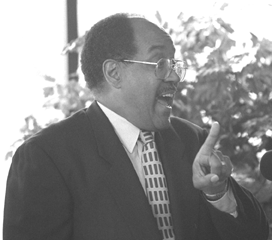The University Record, August 13, 1996
Education remains crucial for minorities,
UNCF’s Gray says
 By Bernie DeGroat
By Bernie DeGroat
News and Information Services
Although African Americans have more opportunities than ever before to attend colleges and universities of their choice, the need for historically Black institutions of higher learning has never been greater, according to William H. Gray, president of The College Fund/UNCF.
During a recent campus visit to discuss the new Frederick D. Patterson Research Institute—established this year in collaboration with the University as the first major research center on African American educational data and policy—Gray said that the high-quality, low-cost education that Black colleges and universities provide will remain crucial for America’s burgeoning minority population.
With tuition rates less than half the national average of other private colleges, the College Fund’s 41 member institutions offer an affordable education to thousands of African Americans in small college settings, he said.
“Our colleges provide a unique environment that many youngsters need—an environment where classes are small, where students are not a computer number, and where there are role models and professors who look like them and have been where they have been,” Gray said. “It is often in that kind of hands-on setting that a young person—who often comes to higher education perhaps not as prepared as others, perhaps whose aptitude cannot be clearly measured by standardized tests—blooms and blossoms.
“Then they are ready to go to great universities like the University of Michigan to get their medical degree or their M.B.A. because they have been brought up to speed, and we have been able to do something that we think most colleges and universities cannot do for them.
“Any educational institution that can take a kid out of the inner-city or out of a rural area, that can take a kid who doesn’t measure up necessarily to the pre-conceived ideas of family structure or income, and give them the ability to become doctors, lawyers, teachers and business leaders, those educational institutions ought to be supported, and that’s why the work of The College Fund is so important.”
Gray said that new endeavors like the Patterson Institute are extremely important because there is a dearth of information about the academic achievement of African Americans and a great deal of misconception surrounding Black education in America today. For example, contrary to popular opinion, he said, a very small percentage (less than 1 percent) of college scholarships are based solely on race and about twice as many African Americans are in college classrooms compared with those behind prison bars.
“That’s the kind of thing that this Institute’s business will be about—pointing out what the facts are and what the truth is really all about,” Gray said. “And without the University of Michigan’s help and partnership, the Institute would not have been possible.”
Headed by U-M education Prof. Michael Nettles and named for the founder of the UNCF, the Patterson Institute has received a commitment of $600,000-$700,000 from the University for research and staff support.
“We have a very bold and ambitious agenda,” Nettles said. “I look forward to having the research that we produce at the Patterson Institute make a contribution to improving educational outcomes for African Americans.”

